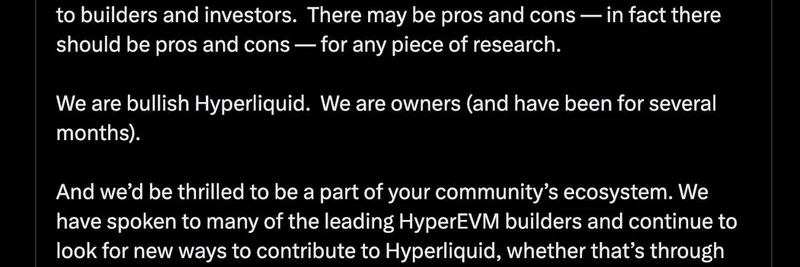In the fast-paced world of blockchain and meme tokens, where community-driven decisions can make or break projects, a recent tweet has sparked intriguing discussions about DAO governance. Hari Krishnan, known on X as @_hrkrshnn, highlighted the unprecedented scale of lobbying in Hyperliquid's DAO proposal for their upcoming stablecoin, USDH.
For those new to the scene, Hyperliquid is a decentralized perpetual futures exchange built on its own blockchain, with its native token HYPE often riding waves of community enthusiasm similar to meme tokens. The platform is now selecting an issuer for USDH, a stablecoin pegged to the US dollar, through a DAO vote. This process has attracted bids from major players like Agora (backed by VanEck), Paxos (partnered with PayPal), Ethena, and others.
Krishnan's tweet points out how traditional finance heavyweights are actively campaigning on social media to win over validators and voters. He describes it as "fascinating," noting tweets from PayPal and Jan van Eck, CEO of the $150 billion asset manager VanEck, as part of this effort.
In PayPal's post, they express enthusiasm for expanding the Hyperliquid community through their vast network, emphasizing Paxos as a compliant and scalable partner for USDH. Paxos, which issues PayPal's stablecoin PYUSD, is positioning itself as the ideal choice with global distribution and regulatory alignment.
Jan van Eck's letter-like tweet to the Hyperliquid community praises the project's technology and governance while advocating for Agora. He reveals VanEck's ownership of HYPE tokens and their interest in contributing, but firmly states they won't be "gang-tackled" or pushed around. Agora, led by Nick van Eck (Jan's son), promises deep liquidity and revenue sharing in their proposal.
Krishnan argues that while this is a massive marketing win, DAO voting might not always lead to the best long-term decisions for startups. He compares it to governments selecting vendors, suggesting that public processes and shareholder votes can't handle the uncertainties of building in crypto as effectively as private decisions.
This scenario raises key questions for meme token enthusiasts and blockchain practitioners: How does intense lobbying affect decentralized governance? Could it introduce centralization risks, or is it a sign of mainstream adoption? In meme communities, where hype drives value, such high-profile endorsements could supercharge token prices but also invite scrutiny.
For more details on the proposals, check out the ongoing discussions on platforms like DL News or CoinDesk. And don't miss the original tweet for the full context.
As Hyperliquid's DAO vote approaches, this event underscores the evolving intersection of traditional finance and crypto, potentially setting precedents for how meme-inspired projects handle big partnerships. Stay tuned to Meme Insider for more insights into these dynamic developments.



